过去完成时讲解练习
过去完成时讲解及练习题(精讲)
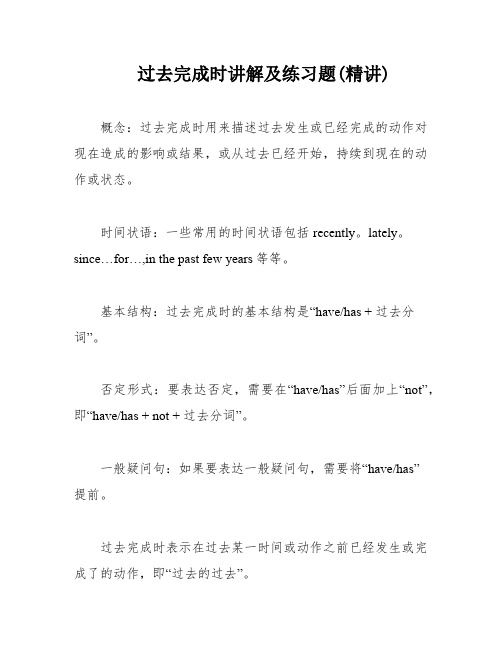
过去完成时讲解及练习题(精讲)概念:过去完成时用来描述过去发生或已经完成的动作对现在造成的影响或结果,或从过去已经开始,持续到现在的动作或状态。
时间状语:一些常用的时间状语包括recently。
lately。
since…for…,in the past few years等等。
基本结构:过去完成时的基本结构是“have/has + 过去分词”。
否定形式:要表达否定,需要在“have/has”后面加上“not”,即“have/has + not + 过去分词”。
一般疑问句:如果要表达一般疑问句,需要将“have/has”提前。
过去完成时表示在过去某一时间或动作之前已经发生或完成了的动作,即“过去的过去”。
构成:过去完成时由“助动词had + 过去分词”构成,其中had通用于各种人称。
例如:They had already had XXX(他们在到达酒店之前已经吃过早餐了。
)XXX 10:00 this morning.(今天早上10点前,她已经写完了作文。
)过去完成时的判断依据有两个:1.由时间状语来判定。
各种时态都有特定的时间状语。
与过去完成时连用的时间状语有:by + 过去的时间点,by the end of + 过去的时间点,before + 过去的时间点等等。
例如:I had finished reading the novel by nine o'clock last night.(昨晚9点前,我已经读完了这本小说。
)XXX English words by the end of last term.(上学期结束时,我们已经学了2000多个英语单词。
)They had XXX last XXX.(上XXX之前,他们已经种了600棵树。
)2.由“过去的过去”来判定。
过去完成时表示“过去的过去”,即过去某一动作之前已经发生或完成的动作,动作有先后关系,动作在前的用过去完成时,在后的用一般过去时。
过去完成时的详细讲解和练习题(全面解析)
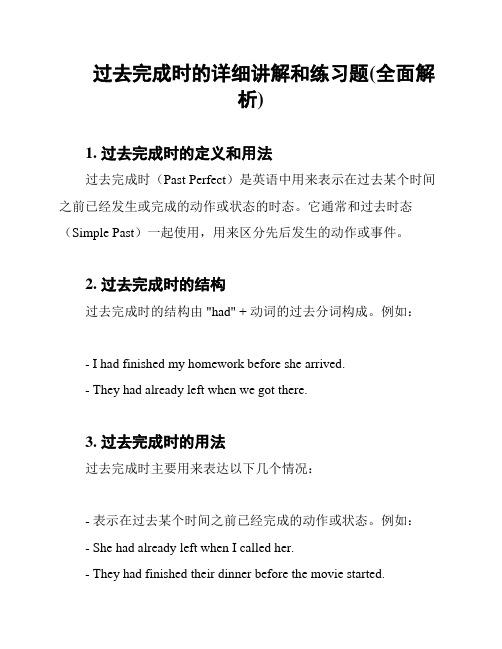
过去完成时的详细讲解和练习题(全面解析)1. 过去完成时的定义和用法过去完成时(Past Perfect)是英语中用来表示在过去某个时间之前已经发生或完成的动作或状态的时态。
它通常和过去时态(Simple Past)一起使用,用来区分先后发生的动作或事件。
2. 过去完成时的结构过去完成时的结构由 "had" + 动词的过去分词构成。
例如:- I had finished my homework before she arrived.- They had already left when we got there.3. 过去完成时的用法过去完成时主要用来表达以下几个情况:- 表示在过去某个时间之前已经完成的动作或状态。
例如:- She had already left when I called her.- They had finished their dinner before the movie started.- 用来构建时间顺序上的递进或对比关系。
例如:- He had visited many countries before he settled down in France.- I had never seen such a beautiful sunset until that day.- 用于条件句中,表示在过去某个时间之前的假设情况。
例如:- If I had known the truth, I would have acted differently.4. 过去完成时的练题请根据句意和语境,使用适当的过去完成时形式填空。
1. By the time I arrived, they __________ their dinner.2. She __________ the book before she went to bed.3. If he __________ more carefully, he wouldn't have made that mistake.4. They __________ their work before the deadline.5. We __________ all the tickets by the time you arrived.参考答案:1. had finished2. had read3. had driven 5. had sold。
过去完成时的详细讲解和练习题(全面解析)
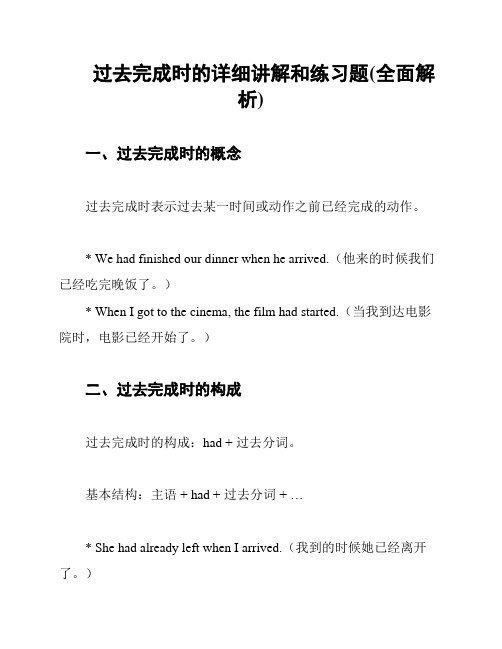
过去完成时的详细讲解和练习题(全面解析)一、过去完成时的概念过去完成时表示过去某一时间或动作之前已经完成的动作。
* We had finished our dinner when he arrived.(他来的时候我们已经吃完晚饭了。
)* When I got to the cinema, the film had started.(当我到达电影院时,电影已经开始了。
)二、过去完成时的构成过去完成时的构成:had + 过去分词。
基本结构:主语 + had + 过去分词+ …* She had already left when I arrived.(我到的时候她已经离开了。
)* I had finished my work before he called.(他打电话之前我已经完成了我的工作。
)三、过去完成时的用法1. 表示过去某个时间点之前已经完成的动作。
* They had gone out before I arrived.(我到之前他们就已经离开了。
)* She had read the book before she went to bed.(她在睡觉前已经读过那本书了。
)2. 表示过去的过去,即在过去某个时间或动作之前已经完成的动作。
常和过去时连用。
* He said that he had visited the museum before.(他说他以前去过博物馆。
)* She had finished her homework when her mother came back.(当她妈妈回来时,她已经完成了作业。
)四、过去完成时的练题1. __________(you, finish) your homework before you went to bed last night?2. By the time we arrived, the party __________(start) .3. I __________(not, see) the movie before last night.4. Before I came to China, I __________(study) Chinese for three years.5. They __________(already, leave) when I got to the station.【答案】1. Had you finished your homework before you went to bed last night?2. By the time we arrived, the party had started.3. I had not seen the movie before last night.4. Before I came to China, I had studied Chinese for three years.5. They had already left when I got to the station.。
【英语】英语过去完成时解题技巧讲解及练习题(含答案)
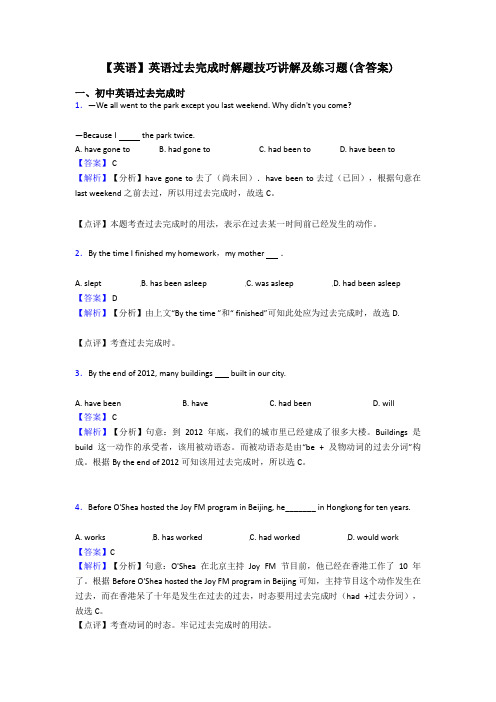
【英语】英语过去完成时解题技巧讲解及练习题(含答案)一、初中英语过去完成时1.—We all went to the park except you last weekend. Why didn't you come?—Because I the park twice.A. have gone toB. had gone toC. had been toD. have been to【答案】 C【解析】【分析】have gone to去了(尚未回).have been to去过(已回),根据句意在last weekend之前去过,所以用过去完成时,故选C。
【点评】本题考查过去完成时的用法,表示在过去某一时间前已经发生的动作。
2.By the time I finished my homework,my mother .A. sleptB. has been asleepC. was asleepD. had been asleep【答案】 D【解析】【分析】由上文“By the time ”和“ finished”可知此处应为过去完成时,故选D.【点评】考查过去完成时。
3.By the end of 2012, many buildings built in our city.A. have beenB. haveC. had beenD. will【答案】 C【解析】【分析】句意:到2012年底,我们的城市里已经建成了很多大楼。
Buildings是build这一动作的承受者,该用被动语态。
而被动语态是由“be + 及物动词的过去分词”构成。
根据By the end of 2012可知该用过去完成时,所以选C。
4.Before O'Shea hosted the Joy FM program in Beijing, he_______ in Hongkong for ten years.A. worksB. has workedC. had workedD. would work【答案】C【解析】【分析】句意:O'Shea在北京主持Joy FM节目前,他已经在香港工作了10年了。
初中过去完成时态讲解带练习
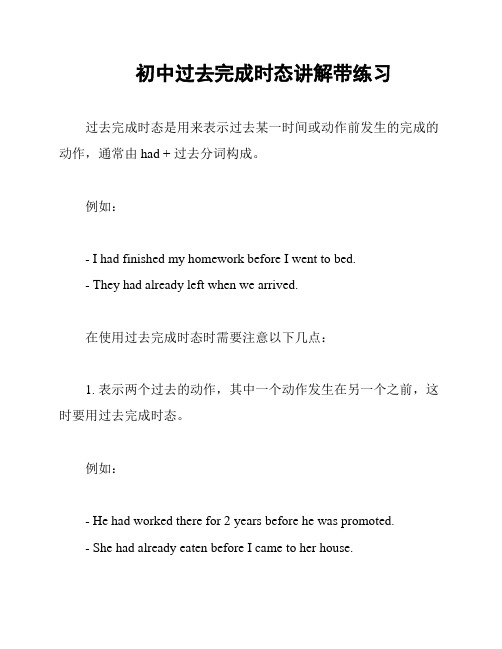
初中过去完成时态讲解带练习过去完成时态是用来表示过去某一时间或动作前发生的完成的动作,通常由had + 过去分词构成。
例如:- I had finished my homework before I went to bed.- They had already left when we arrived.在使用过去完成时态时需要注意以下几点:1. 表示两个过去的动作,其中一个动作发生在另一个之前,这时要用过去完成时态。
例如:- He had worked there for 2 years before he was promoted.- She had already eaten before I came to her house.2. 句子中需要明确表示一个动作发生在另一个动作之前,可以使用过去完成时态。
例如:- When I got home, my mother had already cooked dinner.- By the time we arrived at the cinema, the movie had already started.3. 注意过去完成时态的时间范围,它仅限于过去发生的动作,而不包括现在的动作。
例如:- I have been to Japan before. (不可用过去完成时态)以下是一些练,请用过去完成时态填空:1. By the time I ______ (arrive) at the party, everyone had left.2. She _______ (not finish) her work, so she had to stay late.3. When he __________ (arrive) at the station, the train had already left.4. They _________ (cook) dinner before their guests arrived.5. We _______ (already watch) that movie before.答案:1. arrived2. had not finished3. arrived4. had cooked5. had already watched。
过去完成时讲解及练习
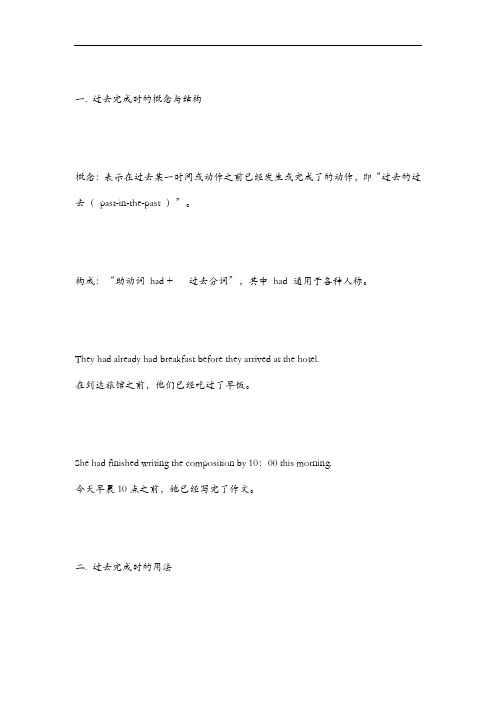
一. 过去完成时的概念与结构概念:表示在过去某一时间或动作之前已经发生或完成了的动作,即“过去的过去(past-in-the-past )”。
构成:“助动词had + 过去分词”,其中had 通用于各种人称。
They had already had breakfast before they arrived at the hotel.在到达旅馆之前,他们已经吃过了早饭。
She had finished writing the composition by 10:00 this morning.今天早晨10点之前,她已经写完了作文。
二. 过去完成时的用法用法1. 表示一个动作或状态在过去某一时间或动作之前已经完成或结束,即发生在“过去的过去”。
例如:When I woke up, it had stopped raining.我醒来时,雨已经停了。
(雨停发生在醒来之前,即“过去的过去”)用法2. 表示某一动作或状态在过去某时之前已经开始,一直延续到这一过去时间,而且动作尚未结束,仍然有继续下去的可能。
例如:By the end of last year, he had worked in the factory for twenty years.到去年年底为止,他已经在这个工厂工作了20年。
(到去年年底为止已工作了20 年,还有继续进行下去的可能)三. 过去完成时的判断依据1. 由时间状语来判定一般说来,各种时态都有特定的时间状语。
与过去完成时连用的时间状语有:(1)by + 过去的时间点,例如:I had finished reading the novel by nine o'clock last night.到昨天晚上九点钟为止,我已经读完了这本小说。
(2)by the end of + 过去的时间点,例如:We had learned over two thousand English words by the end of last term.到上学期末为止,我们已经学了两千多单词。
过去完成时知识点梳理及经典练习(超详细)
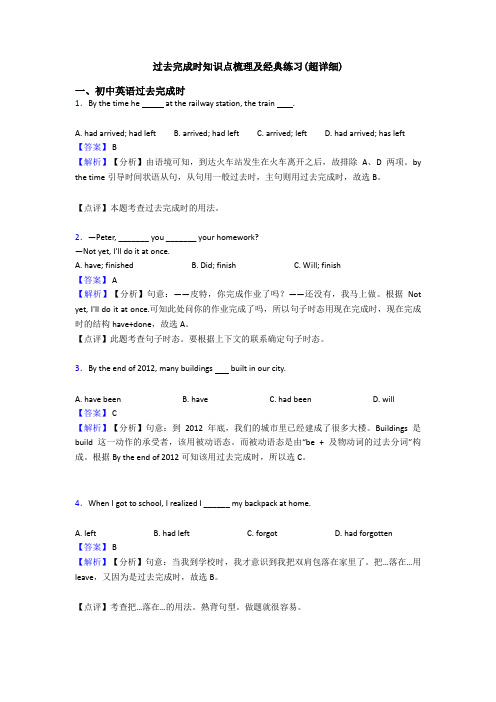
过去完成时知识点梳理及经典练习(超详细)一、初中英语过去完成时1.By the time he at the railway station, the train .A. had arrived; had leftB. arrived; had leftC. arrived; leftD. had arrived; has left 【答案】 B【解析】【分析】由语境可知,到达火车站发生在火车离开之后,故排除A、D两项。
by the time引导时间状语从句,从句用一般过去时,主句则用过去完成时,故选B。
【点评】本题考查过去完成时的用法。
2.—Peter, _______ you _______ your homework?—Not yet, I'll do it at once.A. have; finishedB. Did; finishC. Will; finish【答案】 A【解析】【分析】句意:——皮特,你完成作业了吗?——还没有,我马上做。
根据Not yet, I'll do it at once.可知此处问你的作业完成了吗,所以句子时态用现在完成时,现在完成时的结构have+done,故选A。
【点评】此题考查句子时态。
要根据上下文的联系确定句子时态。
3.By the end of 2012, many buildings built in our city.A. have beenB. haveC. had beenD. will【答案】 C【解析】【分析】句意:到2012年底,我们的城市里已经建成了很多大楼。
Buildings是build这一动作的承受者,该用被动语态。
而被动语态是由“be + 及物动词的过去分词”构成。
根据By the end of 2012可知该用过去完成时,所以选C。
4.When I got to school, I realized I ______ my backpack at home.A. leftB. had leftC. forgotD. had forgotten【答案】 B【解析】【分析】句意:当我到学校时,我才意识到我把双肩包落在家里了。
【英语】英语过去完成时练习题20篇含解析
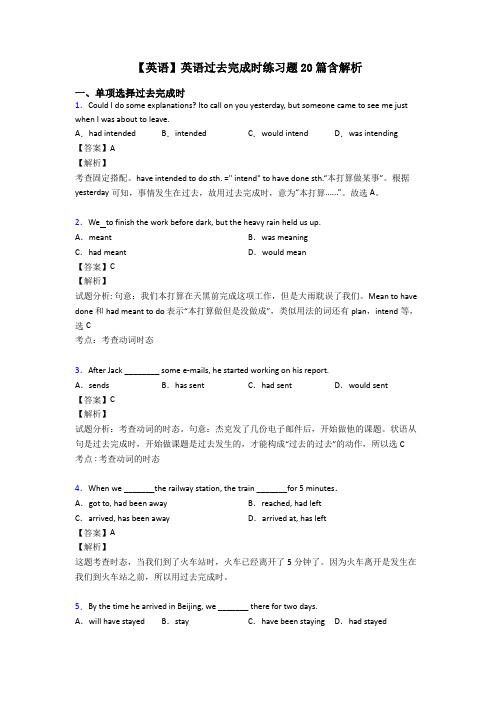
【英语】英语过去完成时练习题20篇含解析一、单项选择过去完成时1.Could I do some explanations? Ito call on you yesterday, but someone came to see me just when I was about to leave.A.had intended B.intended C.would intend D.was intending【答案】A【解析】考查固定搭配。
have intended to do sth. =" i ntend" to have done sth.“本打算做某事”。
根据yesterday可知,事情发生在过去,故用过去完成时,意为“本打算......”。
故选A。
2.We to finish the work before dark, but the heavy rain held us up.A.meant B.was meaningC.had meant D.would mean【答案】C【解析】试题分析: 句意:我们本打算在天黑前完成这项工作,但是大雨耽误了我们。
Mean to have done 和 had meant to do 表示“本打算做但是没做成”,类似用法的词还有plan,intend等,选C考点:考查动词时态3.After Jack ________ some e-mails, he started working on his report.A.sends B.has sent C.had sent D.would sent【答案】C【解析】试题分析:考查动词的时态。
句意:杰克发了几份电子邮件后,开始做他的课题。
状语从句是过去完成时,开始做课题是过去发生的,才能构成“过去的过去”的动作,所以选C考点 : 考查动词的时态4.When we _______the railway station, the train _______for 5 minutes.A.got to, had been away B.reached, had leftC.arrived, has been away D.arrived at, has left【答案】A【解析】这题考查时态,当我们到了火车站时,火车已经离开了5分钟了。
(英语)过去完成时练习及解析
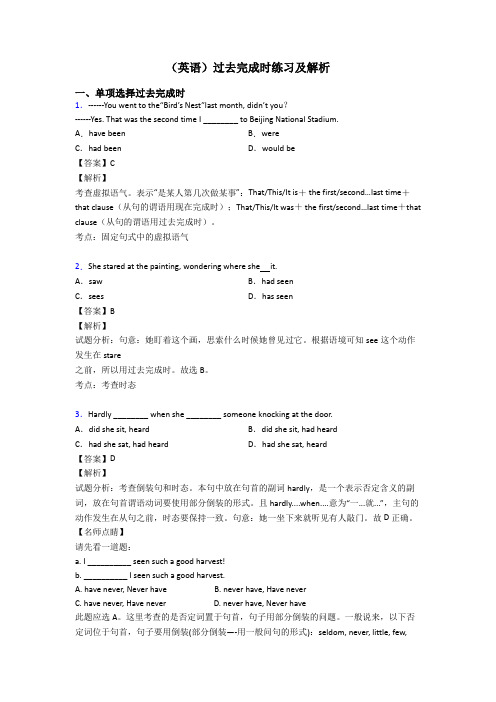
【解析】
试题分析:考查倒装语序及时态。具有(半)否定意义的词或短语位于句首时,用部分倒装。排除C、D选项。由对话第一部分是过去时态,“一个词都没学过”这个动作应发生在过去的过去,故用过去完成时,排除A选项,故选B。句意:——去柏林之前你学过些德语吗?——我一个词都没学过。
考点:考查倒装语序及时态。
Few students did they see in the classroom.他们在教室没看到几个学生。
Not a word did I ever say to him.我从未对他说过一句话。
Not until all the fish in the river died did the villagers realize how serious the pollution was.
5.When we _______the railway station, the train _______for 5 minutes.
A.got to, had been awayB.reached, had left
C.arrived, has been awayD.arrived at, has left
直到河里的鱼全死了,村民们才意识到污染是多么严重。
考点:考查倒装句和时态
4.Sally was excited to meet Susan at the party last night.They _____ each other since they graduated from Oxford University in 2010.
A.did: releasedB.had done; release
C.had done; must releaseD.should do; should release
高中英语时态语态专题-----过去完成时讲解和练习
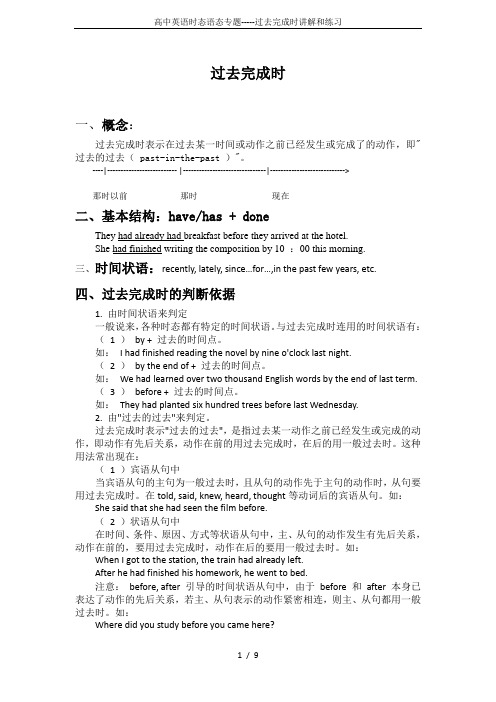
过去完成时一、概念:过去完成时表示在过去某一时间或动作之前已经发生或完成了的动作,即"过去的过去( past-in-the-past )"。
----|-------------------------- |-------------------------------|---------------------------->那时以前那时现在二、基本结构:have/has + doneThey had already had breakfast before they arrived at the hotel.She had finished writing the composition by 10 :00 this morning.三、时间状语:recently, lately, since…for…,in the past few years, etc.四、过去完成时的判断依据1. 由时间状语来判定一般说来,各种时态都有特定的时间状语。
与过去完成时连用的时间状语有:( 1 )by + 过去的时间点。
如:I had finished reading the novel by nine o'clock last night.( 2 )by the end of + 过去的时间点。
如:We had learned over two thousand English words by the end of last term.( 3 )before + 过去的时间点。
如:They had planted six hundred trees before last Wednesday.2. 由"过去的过去"来判定。
过去完成时表示"过去的过去",是指过去某一动作之前已经发生或完成的动作,即动作有先后关系,动作在前的用过去完成时,在后的用一般过去时。
英语过去完成时的用法总结及练习题附答案
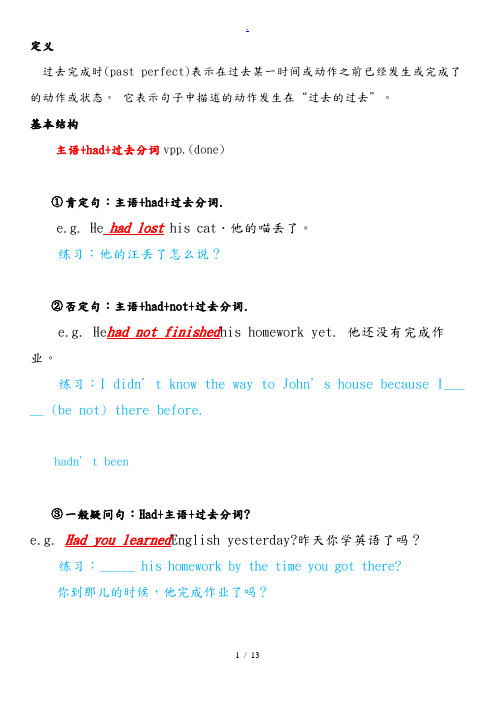
定义过去完成时(past perfect)表示在过去某一时间或动作之前已经发生或完成了的动作或状态。
它表示句子中描述的动作发生在“过去的过去”。
基本结构主语+had+过去分词vpp.(done)①肯定句:主语+had+过去分词.e.g. He had lost his cat.他的喵丢了。
练习:他的汪丢了怎么说?②否定句:主语+had+not+过去分词.e.g. He had not finished his homework yet. 他还没有完成作业。
练习:I didn’t know the way to John’s house because I___ __ (be not) there before.hadn’t been③一般疑问句:Had+主语+过去分词?e.g. Had you learned English yesterday?昨天你学英语了吗?练习:_____ his homework by the time you got there?你到那儿的时候,他完成作业了吗?Had he finished肯定回答:Yes,主语+had.Yes, he had.否定回答:No,主语+had not.No,he had not.(hadn’t)④特殊疑问句:特殊疑问词或词组+一般疑问句(Had+主语+过去分词)?基本用法(1)表示在过去某一时刻或动作以前完成了的动作,也可以说过去的时间关于过去的动作。
即“过去的过去”。
可以用by, before等介词短语或一个时间状语从句来表示,也可以用一个表示过去的动作来表示,还可能通过上下文来表示。
例如:By nine o’clock last night,we had got200 pictures from t he spaceship. 到昨晚9点钟,我们已经收到200 飞船发来的图片。
(2)表示由过去的某一时刻开始,一直延续到过去另一时间的动作或状态,常和for, since构成的时间状语连用。
英语过去完成时练习题及答案及解析

英语过去完成时练习题及答案及解析一、单项选择过去完成时1.—Lily went to see the movie alone.—If she _____ me about it, I would have gone with her.A .should tell【答案】D【解析】考查时态。
句意:丽丽一个人去看电影了。
——如果她告诉过我这件事,我会和她一起去的。
结合语境可知从句中说的是在过去已完成动作,故用过去完成时态。
B .tellsC .toldD .had told2.The girl, when _____ why she _____ in the exam, just lowered her head and kept silent.A .questioned; was cheatedB .being questioned; was cheatingC .questioned; had cheatedD .being questioned; has cheated【答案】C【解析】考查非谓语动词。
句意:当被问到为什么在考试中作弊中,小女孩子低头不语。
When 引导的是是时间状语从句,与girl 之间是被动关系,所以用done 形式,作弊没有被动语态,故选C 项。
3.Hardly ___________the door when he rushed into the office out of breath.A .I openedC .I had opened【答案】D【解析】本题考查hardly...when 结构,表示“一……就、刚刚……就”;句意:我刚把门打开,他就气喘吁吁冲进办公室。
hardly 以及含有否定意义的副词放在句首,句子用倒装结构,故选D 。
【名师点睛】hardly......when 的用法表示一件事紧接着另一件事发生,意思是“刚刚....,就....”。
注意其时态上主句一般用过去完成时,从句用过去时。
过去完成时讲解及练习
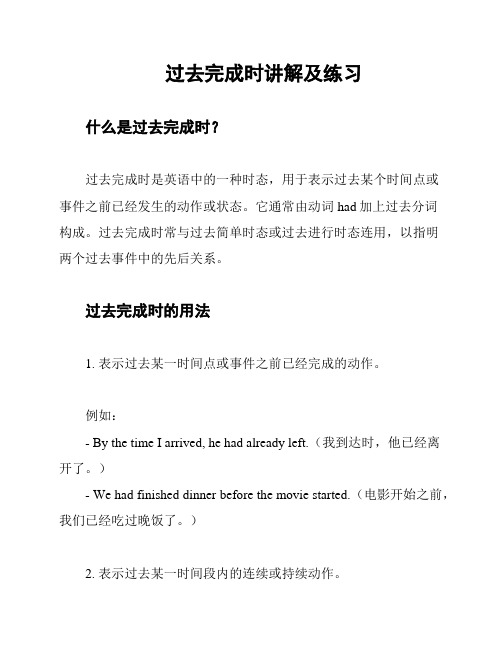
过去完成时讲解及练习什么是过去完成时?过去完成时是英语中的一种时态,用于表示过去某个时间点或事件之前已经发生的动作或状态。
它通常由动词had加上过去分词构成。
过去完成时常与过去简单时态或过去进行时态连用,以指明两个过去事件中的先后关系。
过去完成时的用法1. 表示过去某一时间点或事件之前已经完成的动作。
例如:- By the time I arrived, he had already left.(我到达时,他已经离开了。
)- We had finished dinner before the movie started.(电影开始之前,我们已经吃过晚饭了。
)2. 表示过去某一时间段内的连续或持续动作。
例如:- She had been studying English for three years before she moved to the United States.(她在搬到美国之前已经研究英语三年了。
)3. 表示过去某一时间点或事件之前曾经存在的状态。
例如:- When I arrived, they had already finished their homework.(我到达时,他们已经完成了他们的家庭作业。
)过去完成时的练练一将以下句子改写为过去完成时。
1. He started learning Spanish last year.- Answer: He had started learning Spanish last year.2. They had seen the movie before it was released.- Answer: They had seen the movie before it had been released.3. She finished her work and then she went home.- Answer: She had finished her work and then she went home.练二选择正确的动词形式填空,使用过去完成时。
动-词--过去完成时态-讲解与练习题
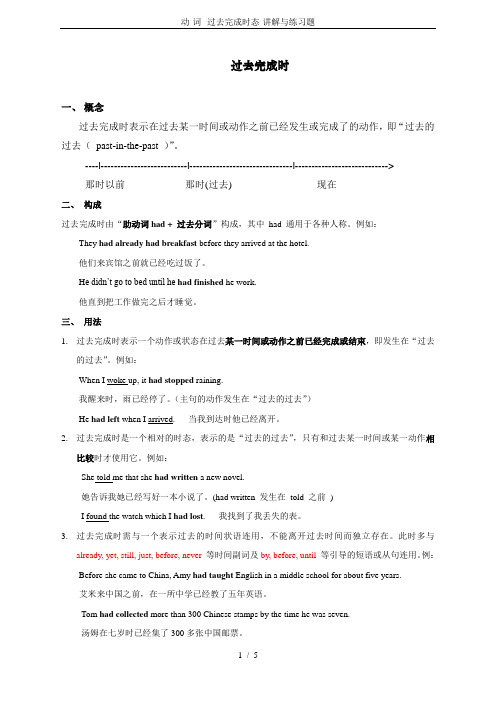
过去完成时一、概念过去完成时表示在过去某一时间或动作之前已经发生或完成了的动作,即“过去的过去(past-in-the-past )”。
----|--------------------------|-------------------------------|---------------------------->那时以前那时(过去)现在二、构成过去完成时由“助动词had + 过去分词”构成,其中had 通用于各种人称。
例如:They had already had breakfast before they arrived at the hotel.他们来宾馆之前就已经吃过饭了。
H e didn’t go to bed until he had finished he work.他直到把工作做完之后才睡觉。
三、用法1.过去完成时表示一个动作或状态在过去某一时间或动作之前已经完成或结束,即发生在“过去的过去”。
例如:When I woke up, it had stopped raining.我醒来时,雨已经停了。
(主句的动作发生在“过去的过去”)He had left when I arrived. 当我到达时他已经离开。
2.过去完成时是一个相对的时态,表示的是“过去的过去”,只有和过去某一时间或某一动作相比较时才使用它。
例如:She told me that she had written a new novel.她告诉我她已经写好一本小说了。
(had written 发生在told 之前)I found the watch which I had lost. 我找到了我丢失的表。
3.过去完成时需与一个表示过去的时间状语连用,不能离开过去时间而独立存在。
此时多与already, yet, still, just, before, never 等时间副词及by, before, until 等引导的短语或从句连用。
过去完成时态讲解及练习
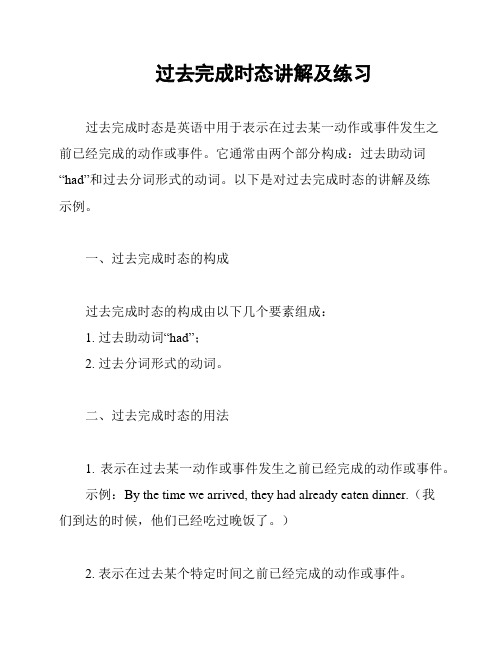
过去完成时态讲解及练习过去完成时态是英语中用于表示在过去某一动作或事件发生之前已经完成的动作或事件。
它通常由两个部分构成:过去助动词“had”和过去分词形式的动词。
以下是对过去完成时态的讲解及练示例。
一、过去完成时态的构成过去完成时态的构成由以下几个要素组成:1. 过去助动词“had”;2. 过去分词形式的动词。
二、过去完成时态的用法1. 表示在过去某一动作或事件发生之前已经完成的动作或事件。
示例:By the time we arrived, they had already eaten dinner.(我们到达的时候,他们已经吃过晚饭了。
)2. 表示在过去某个特定时间之前已经完成的动作或事件。
示例:She had finished her homework by 8 o'clock last night.(昨晚8点以前,她已经做完了作业。
)三、过去完成时态的注意事项1. 过去完成时态通常与表示过去的时间状语连用,例如“by the time”,“before”,“after”,“when”,“until”等。
示例:By the time they woke up, the sun had already risen.(他们醒来时,太阳已经升起。
)2. 注意句子的时态一致性,主句使用过去时态时,从句可使用过去完成时态。
示例:He said that he had already been to Japan twice.(他说他已经去过日本两次。
)四、过去完成时态的练以下是一些练题,帮助巩固对过去完成时态的理解:1. 他们已经完成了工作吗?2. 昨天晚上我在睡觉前已经刷牙了。
3. 他们在我到达之前已经离开了。
4. 你曾经去过那个城市吗?5. 吉姆离开前已经呆了一个小时了。
请根据上述规则和示例完成练题,加深对过去完成时态的掌握。
以上是关于过去完成时态的讲解及练习。
希望通过本文档的阅读和练习,您能更好地理解和掌握过去完成时态的用法和构成。
【英语】过去完成时-知识点归纳与练习

【英语】过去完成时-知识点归纳与练习一、初中英语过去完成时1.—Are you surprised at the ending of the movie?—No, because I ___________ the story.A. readB. will readC. have readD. was reading【答案】 C【解析】【分析】句意:—你对这部电影的结局感到惊讶吗?—不惊讶,因为我读过这个故事。
根据语境判断,这本书已经读过,应该用现在完成时态来表示,故答案为C。
【点评】考查现在完成时态。
主语为第一人称故动词应使用原形。
2.When I got to school, I realized I ______ my backpack at home.A. leftB. had leftC. forgotD. had forgotten【答案】 B【解析】【分析】句意:当我到学校时,我才意识到我把双肩包落在家里了。
把…落在…用leave,又因为是过去完成时,故选B。
【点评】考查把…落在…的用法。
熟背句型。
做题就很容易。
3.When I ______ the cinema, the film _______for ten minutesA. got to; has begunB. arrived at; has been onC. reached; had begunD. hurried to; had been on【答案】 D【解析】【分析】这题考查时态,第一空几个选项都可以,第二空指“我到电影院之前电影已经开始5分钟了”,用过去完成时,又因为begin是短暂动词,不能和一段时间连用,所以选D。
【点评】要注意完成时态中的延续性动词的转换。
4.I got to the party late. By the time I arrived, some people ______ home already.A. wentB. would goC. had goneD. have gone 【答案】 C【解析】【分析】句意:我到聚会晚了。
过去完成时的使用方法讲解及练习题(详细介绍)
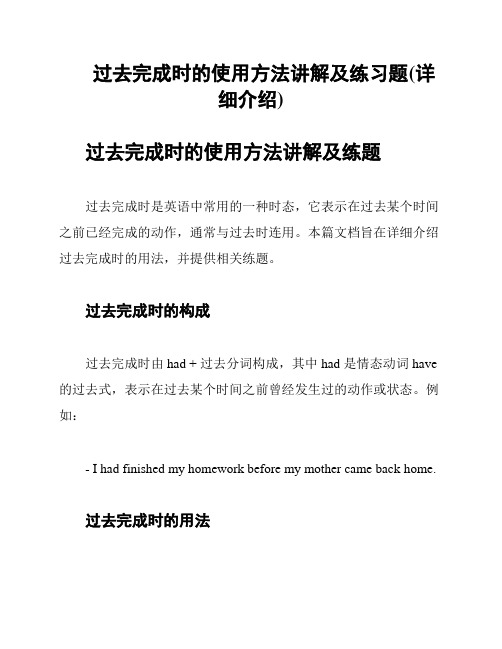
过去完成时的使用方法讲解及练习题(详细介绍)过去完成时的使用方法讲解及练题过去完成时是英语中常用的一种时态,它表示在过去某个时间之前已经完成的动作,通常与过去时连用。
本篇文档旨在详细介绍过去完成时的用法,并提供相关练题。
过去完成时的构成过去完成时由 had + 过去分词构成,其中 had 是情态动词 have 的过去式,表示在过去某个时间之前曾经发生过的动作或状态。
例如:- I had finished my homework before my mother came back home.过去完成时的用法过去完成时表示在过去某个时间之前已经完成的动作。
通常与过去时连用,用于强调两个已经完成的动作的先后顺序。
例如:- He had already left when I arrived at the airport.- They had been married for 5 years before they decided to have a baby.过去完成时也可以用于条件从句中,表示对过去某个条件的假设。
例如:过去完成时和其他过去时态的区别过去完成时常常和过去时连用,两者的区别在于过去完成时强调的是两个已经完成的动作之间的先后顺序,而过去时则只表示过去发生的动作。
例如:- He went to bed after he had finished his homework.- He went to bed after he finished his homework.练题请用适当的时态填空:1. By the time he arrived, we __________ (finish) our lunch.2. She __________ (never, see) such a beautiful sunset before she came to Hawaii last summer.3. If I __________ (have) enough money, I would have bought the car.4. They __________ (watch) the movie twice before they realized it was boring.5. She __________ (study) English for 3 years before she went to the UK.答案:1. had finished2. had never seen3. had had4. had watched5. had studied。
过去完成时-知识点归纳与练习
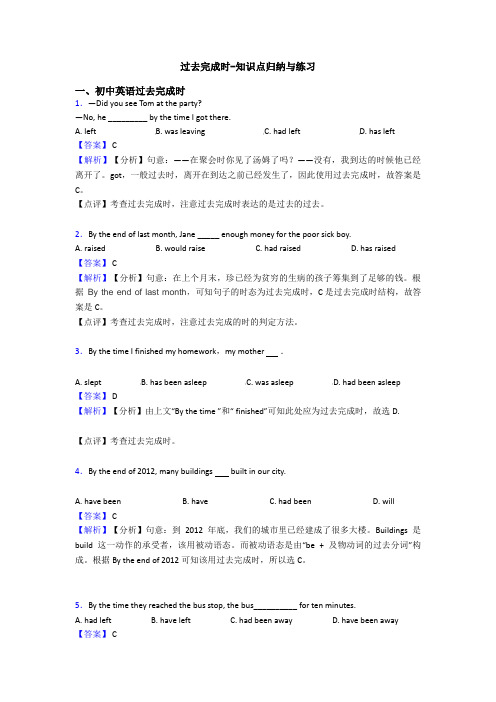
10.—I ______ know you can play the piano so well.
—Thank you.
A. didn't B. don't C. can't
【答案】A
【解析】【分析】句意:——我不知道你钢琴弹得那么好。——谢谢。A. didn't不,一般过去时态,指过去的状态及过去发生的动作;B. don't不,一般现在时态,指经常性、习惯性的动作;C. can't不能,指能力;不可能,表示否定的推测。根据语境,说话时我已知道你钢琴弹得好,不知道是过去的状态,用一般过去时,故选A。
A. raised B. would raise C. had raised D. has raised
【答案】C
【解析】【分析】句意:在上个月末,珍已经为贫穷的生病的孩子筹集到了足够的钱。根据By the end of last month,可知句子的时态为过去完成时,C是过去完成时结构,故答案是C。
【点评】考查被动语态及过去完成时的用法。
16.—your fathera newspaper when you got home?
— No,.
A. Was;reading;he was B. Did;read;he did
C. Was;reading;he wasn't D. Did;read;he didn't
A. had, gone B. had, went C. has, gone D. has, went
【答案】A
【解析】【分析】这题考查时态的用法,by the time是连词词组,可以连接时间状语从句,“到什么时候为止”,主句一般和相应的完成时连用,因为从句是过去时,所以从句用过去完成时连用。选A。句意是:到她出去的时间为止,公共汽车已经走了。
过去完成时讲解及练习
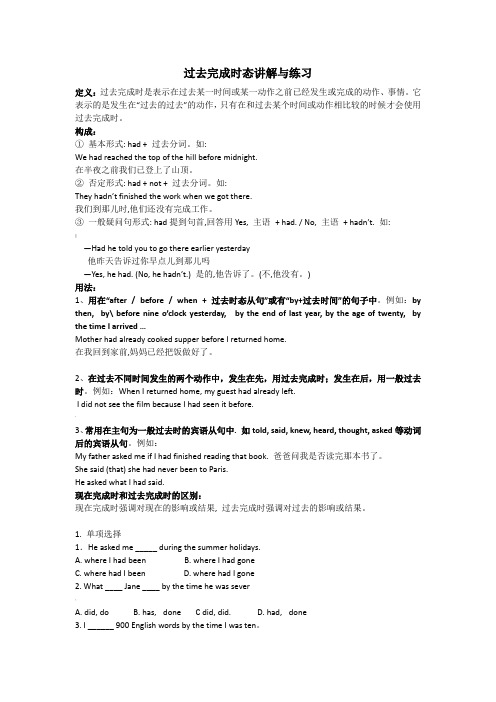
过去完成时态讲解与练习定义:过去完成时是表示在过去某一时间或某一动作之前已经发生或完成的动作、事情。
它表示的是发生在“过去的过去”的动作,只有在和过去某个时间或动作相比较的时候才会使用过去完成时。
构成:①基本形式: had + 过去分词。
如:We had reached the top of the hill before midnight.在半夜之前我们已登上了山顶。
②否定形式: had + not + 过去分词。
如:They hadn’t finished the work whe n we got there.我们到那儿时,他们还没有完成工作。
③一般疑问句形式: had提到句首,回答用Yes, 主语+ had. / No, 主语+ hadn’t. 如:|—Had he told you to go there earlier yesterday他昨天告诉过你早点儿到那儿吗—Yes, he had. (No, he hadn’t.) 是的,他告诉了。
(不,他没有。
)用法:1、用在“after / before / when + 过去时态从句”或有“by+过去时间”的句子中。
例如:by then, by\ before nine o’clock yesterday,by the end of last year, by the age of twenty, by the time I arrived …Mother had already cooked supper before I returned home.在我回到家前,妈妈已经把饭做好了。
2、在过去不同时间发生的两个动作中,发生在先,用过去完成时;发生在后,用一般过去时。
例如:When I returned home, my guest had already left.I did not see the film because I had seen it before.`3、常用在主句为一般过去时的宾语从句中. 如told, said, knew, heard, thought, asked等动词后的宾语从句。
过去完成时态讲解及练习

过去完成时态讲解及练习文稿归稿存档编号:[KKUY-KKIO69-OTM243-OLUI129-G00I-FDQS58-完成时态1)过去完成时态的构成:肯定式:had + 动词的过去分词否定式:hadn't + 动词的过去分词疑问式:Had … + 动词的过去分词简略回答: Yes, 主 + have/has had.No, 主 + had现在完成时的用法2) 过去完成时适用场合1. 过去完成时表示在过去某一时间或动作以前已经完成了的动作。
这个过去的时间常用by,before等介词短语或一个时间状语从句表示,也可以暗含在上下文中。
I had finished my homework before supper.我在晚饭前就把作业做完了。
The play had already started when we got to the theatre. 我们到剧场时戏已经开始了。
By the end of June they had treated over 10,000 patients. 到六月底他们已经治疗了一万多病人。
2. 过去完成时还可表示过去某一时刻之前发生的动作或状态持续到过去某个时间或还要持续下去,常与for,since等词连用。
如:He had served in the army for ten years before he retired last year. 他在部队干了十年,去年退役了。
He told me that he had known her since he was a child. 他告诉我他从小就认识她。
He had learned English for eight years before he went to England for further study. 他在去英国深造前,已学了八年英语。
3. 在一段情景连贯的文字中,先发生的事放在后面叙述时,要用过去完成时。
- 1、下载文档前请自行甄别文档内容的完整性,平台不提供额外的编辑、内容补充、找答案等附加服务。
- 2、"仅部分预览"的文档,不可在线预览部分如存在完整性等问题,可反馈申请退款(可完整预览的文档不适用该条件!)。
- 3、如文档侵犯您的权益,请联系客服反馈,我们会尽快为您处理(人工客服工作时间:9:00-18:30)。
过去完成时(past perfect)表示在过去某一时间或动作之前已经发生或完成了的动作。
它表示句子中描述的动作发生在“过去的过去”。
基本结构:主语+had+过去分词(done)①肯定句:主语+had+过去分词+其他.②否定句:主语+had+not+过去分词+其他.③一般疑问句:Had+主语+过去分词+其他肯定回答:Yes,主语+had.否定回答:No,主语+had not .④特殊疑问句:特殊疑问词或词组+一般疑问句(Had+主语+过去分词+其他)基本用法。
(1)表示在过去某一时刻或动作以前完成了的动作,也可以说过去的时间关于过去的动作。
即“过去的过去”。
可以用by, before等介词短语或一个时间状语从句来表示,也可以用一个表示过去的动作来表示,还可能通过上下文来表示。
例如:By nine o’clock last night, we had got 200 pictures from the spaceship.到昨晚9点钟,我们已经收到200 张飞船发来的图片。
(2)表示由过去的某一时刻开始,一直延续到过去另一时间的动作或状态,常和for, since 构成的时间状语连用。
例如:I had been at the bus stop for 20 minutes when a bus finally came.当车来的时候,我在车站已等了20分钟。
He said he had worked in that factory since 1949.他说自从1949年以来他就在那家工厂工作。
(3)叙述过去发生的事情,在已叙述了过去发生的事情后,反过来追述或补述以前发生的动作时,常使用过去完成时。
例如:Mr. Smith died yesterday. He had been a good friend of mine.~史密斯先生昨天去世了。
他以前是我的好友。
I didn’t know a thing about the verbs, for I had not studied my lesson.我对动词一无所知,因为我没有好好学习功课。
(4)在含有定语从句的主从复合句中,如果叙述的是过去的事,先发生的动作常用过去完成时。
例如:I returned the book that I had borrowed.我已归还了我借的书。
She found the key that she had lost.她丢失的钥匙找到了。
(5)过去完成时常常用在told,said,knew,heard,thought等动词后的宾语从句(或间接引语)中,这时从句中的动作发生在主句表示的过去的动作之前。
例如:He said that he had known her well.(他说他很熟悉她。
I thought I had sent the letter a week before.我认为我一星期前就把信寄出去了。
(6)状语从句:在过去不同时间发生的两个动作中,发生在前,用过去完成时;发生在后,用一般过去时。
如when,before,after,as soon as,till/until引导的例如:When I woke up, it had already stopped raining.我醒来时雨已停了。
She didn’t go to bed until she had finished her work.她直到把工作做完之后才睡觉。
注意:如果两个动作紧接着发生,则常常不用过去完成时,特别是在包含before和after 的复合句中,因为这时从句的动作和主句的动作发生的先后顺序已经非常明确,这时可以用一般过去时代替过去完成时。
}例如:After he arrived in England, Marx worked hard to improve his English.马克思到达英格兰之后,努力提高他的英语水平。
(7)动词think, want, hope, mean, plan, intend等用过去完成时来表示过去未曾实现的想法,希望,打算或意图等。
例如:They had wanted to help but could not get there in time.他们本来打算去帮忙,但没有及时赶到那里。
We had hoped to be able to come and see you .我们本来希望能来看看你。
(8)过去完成时还可用在hardly…when…, no sooner…than…, It was the firs t (second, etc) time (that)…等固定句型中。
例如:Hardly had he begun to speak when the audience interrupted him.~他刚开始演讲,听众就打断了他。
No sooner had he arrived than he went away again他刚到就又走了。
It was the third time that he had been out of work that year.这是他那一年第三次失业了。
时间状语before,when,after,by+,until, once,had no sooner……than过去完成时-语法判定1. 由时间状语来判定一般说来,各种时态都有特定的时间状语。
与过去完成时连用的时间状语有:。
( 1 )by + 过去的时间点。
如:I had finished reading the novel by nine o'clock last night.( 2 )by the end of + 过去的时间点。
如:We had learned over two thousand English words by the end of last term.(3 )before + 过去的时间点。
如:They had planted six hundred trees before last Wednesday.2. 由“过去的过去”来判定。
过去完成时表示“过去的过去”,是指过去某一动作之前已经发生或完成的动作,即动作有先后关系,动作在前的用过去完成时,在后的用一般过去时。
这种用法常出现在:( 1 )宾语从句中当宾语从句的主句为一般过去时,且从句的动作先于主句的动作时,从句要用过去完成时。
在told, said, knew, heard, thought等动词后的宾语从句。
如:—She said that she had seen the film before.( 2 )状语从句中在时间、条件、原因、方式等状语从句中,主、从句的动作发生有先后关系,动作在前的,要用过去完成时,动作在后的要用一般过去时。
如:After he had finished his homework, he went to bed.注意:before, after 引导的时间状语从句中,由于before 和after 本身已表达了动作的先后关系,若主、从句表示的动作紧密相连,则主、从句都用一般过去时。
如:After he closed the door, he left the classroom.(3)表示意向的动词,如hope, wish, expect, think, intend, mean, suppose等,用过去完成时表示"原本…,未能…"We had hoped that you would come, but you didn't.3. 根据上、下文来判定。
I met Wang Tao in the street yesterday. We hadn't seen each other since he went to Beijing.—过去完成时-语法区别一、过去完成时与现在完成时的区别现在完成时表示的动作发生在过去,以现在的时间为基点,但侧重对现在产生的结果或造成的影响,与现在有关,其结构为“助动词have (has) + 过去分词”;过去完成时则是一个相对的时态,已过去时间为基点,它所表示的动作不仅发生在过去,更强调“过去的过去”,只有和过去某时或某动作相比较时,才用到它。
比较:I have learned 1000 English words so far.到目前为止我已经学会了1000 个英语单词。
I had learned 1000 English words till then.到那时为止我已经学会了1000 个英语单词。
— I'm sorry to keep you waiting. 对不起,让你久等了。
— Oh, not at all. I have been here only a few minutes.没什么,我只等了几分钟。
(“等”的动作从过去某一时间点持续到现在)二、过去完成时与一般过去时的区别虽然这两种时态都表示过去发生的动作或存在的状态,但在使用时应注意以下几点:1. 时间状语不同:过去完成时在时间上强调“过去的过去”;而一般过去时只强调过去某一特定的时间。
,比较:They had arrived at the station by ten yesterday.They arrived at the station at ten yesterday.2. 在没有明确的过去时间状语作标志时,谓语动词动作发生的时间先后须依据上下文来判断:先发生的用过去完成时,后发生的则用一般过去时。
She was very happy. Her whole family were pleased with her, too. She had just won the first in the composition competition.3. 当两个或两个以上接连发生的动作用and 或but 连接时,按时间顺序,只需用一般过去时来代替过去完成时;另外,在before ,after ,as soon as 引导的从句中,由于这些连词本身已经表示出时间的先后,因此也可以用过去时来代替过去完成时。
He entered the room, turned on the light and read an evening paper.—Ⅰ. Multiple Choices.1.I lost the dictionary I ________.A.have bought B.bought C.had bought D.had been bought2.The train had gone when my brother _______ at the station.A.have arrived B.arrived C.had arrived D.am arriving3. Mary _______ of visiting her grandmother, but the bad weather made her change her mind.A.has thought B.thought C.had thought D.had been thought4.------Did you meet Tom at the airport ------No,he _______ by the time I ______ there.A.has left;got B.had left;arrived C.left;arrived D.left;had got5.-------Why didn’t Tom attend the meeting yesterday -------He __________ Beijing.A.has gone to B.had gone to C.went to D.had been to6.-------I _______ to come to help you.------But you didn’t come.A.have meant B.had meant C.meant D.will mean7.Finally one of my friends _______ by Beijing University,for which she ___ five timesA.were admitted; had tried B.was admitted; had tried C.were admitted; has tried D.was admitted; tried8.------I have bought you the books you want.------Oh,good,I _______ afraid you had forgotten.A.was B.am C.had been D.have been9.We _________ four thousand new words by the end of last year.A.had learned B.have learned C.learned D.will have learned`10.Helen _______her keys in the office so she had to wait until her husband ______home.A.has left;comes B.left;had come C.had left;came D.had left;would come11. My father _________ to the hospital when I hurried home.A. had goneB. wentC. had been takenD. had been sent12. ----- Jim, ________ you _________ your homework----- Yes, of course, but I ________ it late bed time.A. do do; finishedB. did do; had finishedC. have done; had finishedD. have done; finished13. You ____ football after school. Why not go home and do your homework firstA. always playedB. are always playingC. have always playedD. have always been playing es}14. Ever since Picasso’s painting went on exhibit, there ____ large crowds at the museum every day.A. isB. has beenC. have beenD. had been15. ---What do you think of my suggestion --- Sorry. What’s that I _____ about something else.A. was thinkingB. thoughtC. am thinkingD. had thoughtⅡ. Fill in the blanks according to the meanings of the sentences by using tenses of the verbs.1. How many English songs ___________ she __________ (learn) by the end of last month、2. Hardly _______ I ______ (get) on the bus when it started to move3. He __________________(read) the book before he was ten years old.4. She said she ___________________ (see) the film before.5. Our English teacher _________________ (teach) English in Guangxi for ten years before he came to Middle School.、6. By the end of last month, they _________________(complete)the bridge .7. No sooner ________ I _______ (go) out than he came to see me.89. The classroom _______________ (clean) before we ___________ (get) there yesterday.10. ________ the boy ___________ (finish) his homework before you saw him11. When we got to the station, the train _____________ already _____________. (leave)12. The book __________ by the end of last month. (finish)13. When I got back to the shop , my bag _________________ (take) away by someone else.14. When I arrived at the cinema, the film _________________ (be )on for ten minutes.15. ---What’s that terrible noise---The neighbors ______ (prepare) for a party.…16. The mayor of Beijing says that all construction work for the Beijing Olympics ______ ( complete) by 2006.17. The teacher, with 6 girls and 8 boys of her class, ______ (visit) a museum when the earthquake struck.18. ---Mr. Johnson didn’t turn up at the meeting yesterday morning, did he--- No. We __________ (wait) till twelve o’clock. A whole morning was wasted.19. ---Why haven’t you asked her to come he re---She _______ (do) an important experiment when I found her and she ________ (not, finish) it.答案:Keys:Ⅰ. 1-5 CBCBB 6-10 BBAAC 11-15. DDBCAⅡ. 1. had learnt 2. had got 3. had read 4. had seen 5. had taught 6. had completed 7. had gone 8. had gone 9. had been cleaned, got 10. Had finished 11. had left 12. had been finished 13. had been taken 14. had been on 15. are preparing 16. will have been completed 17. was visiting 18. were waiting 19. was doing, hasn’t finished. He asked where I _______________ (go) during the summer vacation`。
